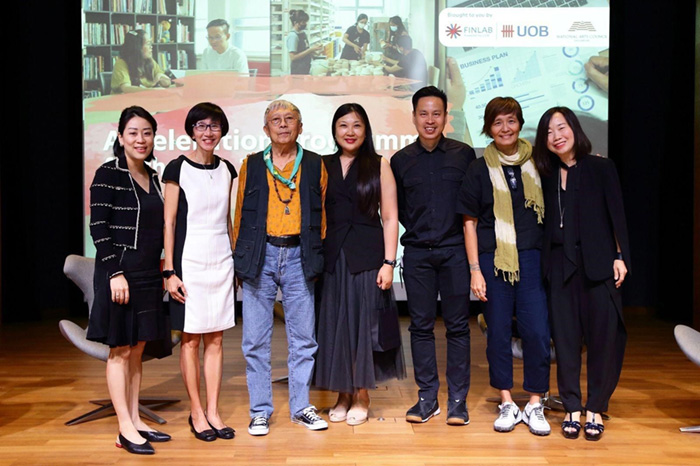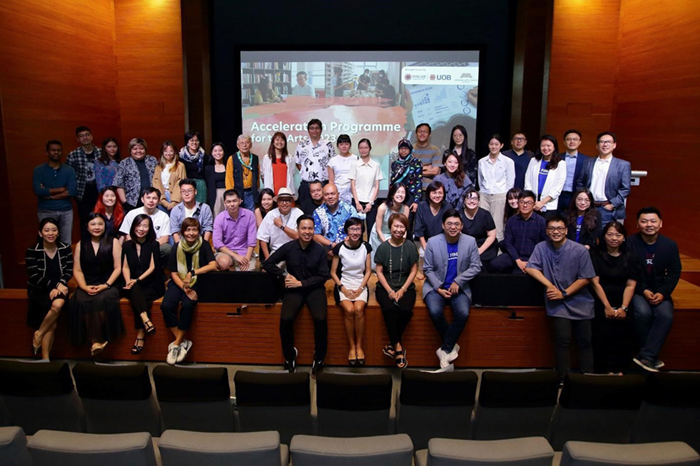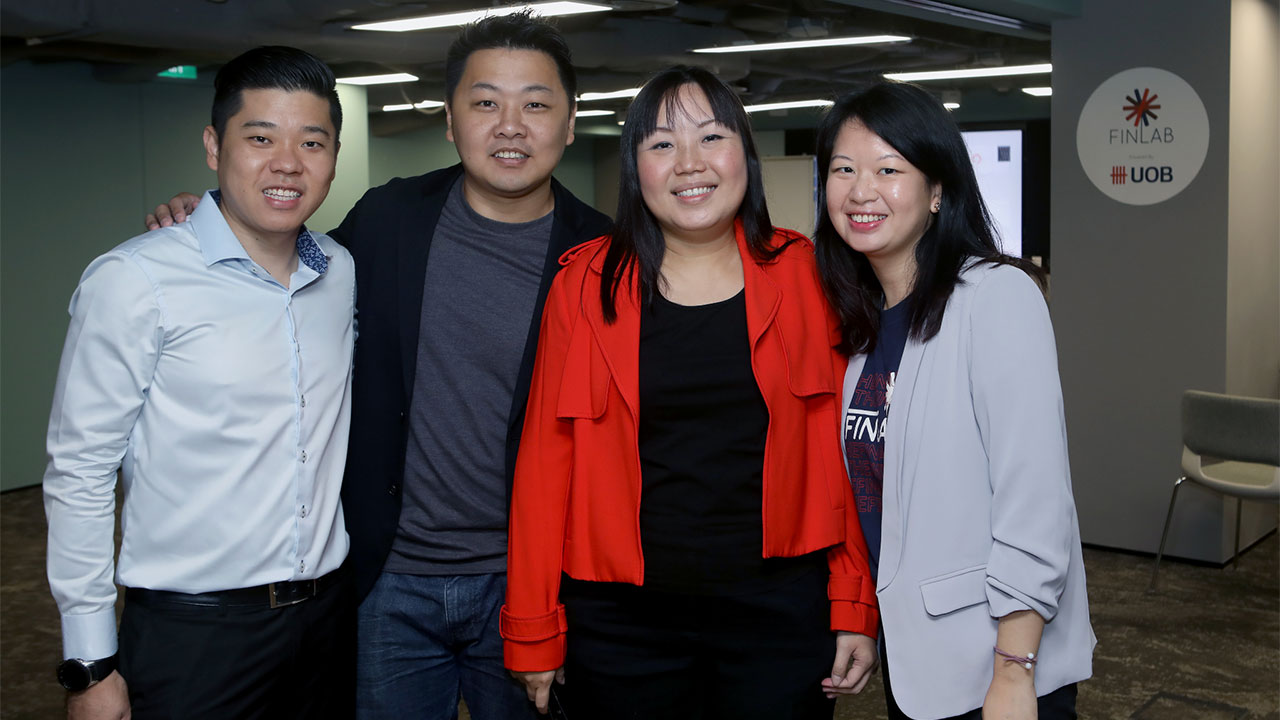Digitalisation has become an imperative in every industry, and the arts are no exception.
The pandemic spurred a wave of digital transformation among arts organisations, who drew on innovations like virtual reality to create digital experiences. Post-pandemic, digital adoption remains crucial for the arts to thrive.
To engage a new generation of digital-native audiences, arts practitioners need to embrace digital marketing and new digital spaces like the metaverse. Digital tools can also spur growth for their business – UOB’s SME Outlook Study 2022 reveals that SMEs who had digitalised saw higher productivity and improved customer experience as compared to those who did not.
Digitalisation is a key part of the recently refreshed Our SG Arts Plan, as outlined in a speech by Ms Low Yen Ling, Minister of State for Culture, Community and Youth. To accelerate digital adoption across the arts sector, the National Arts Council (NAC) is joining forces with private stakeholders like UOB to develop digital initiatives.
One such initiative is the Acceleration Programme for the Arts 2023. Jointly developed by UOB’s innovation accelerator, The FinLab, and NAC, this pioneering programme aims to help arts organisations leverage digital solutions to bolster their businesses.
Building business resilience with the power of digital
Spread across four weeks, the Acceleration Programme for the Arts is designed to guide artists and art organisations in strengthening their digital capabilities and business thinking.
Through a mix of expert-led workshops, panel discussions, and learning sessions, participants will be challenged to reimagine their business strategies and manage their operations more effectively. UOB mentors will also share new business models that can help art practitioners build more resilient organisations.
The first cycle of the programme ran from 14 March to 4 April 2023, with 38 participants across various arts groups. Applications for the second batch are set to open in the coming months. Individual and self-employed artists are welcome to join.

Ms Janet Young, Managing Director, Head of Group Channels and Digitalisation and Group Strategic Communications and Brand, UOB (2nd from the left) and Ms Lynette Pang, Deputy CEO, Planning and Corporate Development, National Arts Council (1st from the right), with the panelists at the opening ceremony
To get an idea of what to expect, here’s a look at what our first batch of participants learnt:
Week 1: Reimagine Your Business with Value Proposition
Week 1 kicked off with a panel discussion on “Navigating the Intersection of Arts, Business, and Digitalisation”. Leading local art practitioners shared their insights on the power of technology to reshape the way artists create, connect, and collaborate in a digital age.
Following this, The FinLab’s Mentor-In-Residence, Felix Tan, conducted a Business Model Canvas workshop. Participants learnt how to discover opportunities and shape strategies to keep their business relevant in a fast-changing environment.
One key takeaway shared by Felix was how to formulate realistic business ideas through the intersection of desirability, feasibility, and viability. Accounting for all three factors reduces risks and increases the likelihood of long-term success.
Week 2: Business and Marketing Strategies Fundamentals for Creatives
Week 2 featured a sharing session on digital media and marketing by three industry experts: Luke B., a Lecturer at Singapore Polytechnic’s Media, Arts & Design School; Ong Kah Jing, a Documentary Storyteller at OKJ Works; and Tan Jia Yee, Director, Creative and Social at Tate Anzur.
Participants were guided through the process of performing a brand audit and gained insights into the five steps of crafting a successful digital marketing strategy. They also picked up tried-and-tested tips on overcoming the challenges of audience targeting, sharing their unique value proposition, and getting the most out of their digital marketing campaigns.
Industry experts shared their insights on using digital media and marketing to expand their reach amongst a new breed of arts audiences.
Week 3: Improving Your Business Operations
By tapping into the power of digital, arts practitioners learnt how to drive efficiency and innovation in their business operations.
In a learning session on “Improving Your Business Operations”, Sharon Ong, Vice-President of Design and Communications at Inmagine, shared that AI-driven technology that are part of INMAGINE’S suite of tools, like Designs.ai and Pixlr, can help arts organisations streamline the process of creating digital marketing materials to optimise their time.
Participants also benefited from a panel discussion on “Innovation in the Arts Industry Leveraging Digital Tools to Reshape Business Operations,” moderated by William Phuan, Executive Director at the Singapore Book Council.
The discussion was attended by Benedict Tay, Head of Customer Engagement, Development and Partnership, Business Banking at UOB; Candice Chua, UOB Branch Manager; Jasdeep Sandhu, Founder of Gajah Gallery; and Kee Siak Chan, Founder and Chief Executive Officer of Exabytes.
These experts shared their thoughts and insights on how art organisations can use various digital media not only to optimise and streamline their work, but also to reach a wider, younger, and more diverse audience.
Week 4: The Future of Art and Business
As the arts, business, and digitalisation continue to intersect, what lies ahead for the future of the arts industry?
During the closing ceremony of the inaugural Acceleration Programme for the Arts, Damian Kim, Managing Director of Meta Singapore, took the stage to deliver a keynote speech on the transformation of the internet and social technology, highlighting the metaverse as the upcoming milestone in this progression.
It was also announced that Meta launched “Art Reimagined Singapore,” whose aim is to provide Singaporeans with more opportunities to experience traditional art through AR.
A sharing session was also conducted by Clarence Chan, Founder of Bandwagon, who talked about the opportunities the Metaverse and other Web 3.0 technologies could bring to artists. One of these examples is the Bandwagon Pixel Party, a concert held in the metaverse to showcase new Asian talent. This gave the audience a chance to interact with each other’s avatars and mind for NFTs.

The inaugural batch of participants during the opening ceremony for the Acceleration Programme for the Arts 2023
Championing Singapore’s arts scene
The Acceleration Programme for the Arts comes as part of UOB’s broader commitment to supporting the development of Singapore’s arts scene. Last year, UOB signed a Memorandum of Understanding with the National Arts Council, cementing a strategic partnership to develop the financial and business competencies of the local arts community.
“Just like banking, art plays an important role in connecting communities,” said Mr Wee Ee Cheong, Deputy Chairman and Chief Executive Officer of UOB. “As a leading Bank in ASEAN and a longstanding patron of the Arts in Singapore and across the region, we are honoured to partner NAC, to help develop local artists and create a vibrant arts scene in Singapore.”
Looking ahead, UOB will leverage its expertise in finance, along with its robust ecosystem of partners, to empower arts practitioners and businesses. As the arts sector continues to mature in an evolving landscape, digitalisation will be key for organisations to take on new challenges and stay relevant.
Learn more about the Acceleration Programme for the Arts here.
This article is jointly written by The FinLab and UOB. This article shall not be copied or relied upon by any person for whatever purpose. This article is given on a general basis without obligation and is strictly for information only. The information contained in this article is based on certain assumptions, information and conditions available as at the date of the article and may be subject to change at any time without notice. You should consult your own professional advisers about the issues discussed in this article. Nothing in this article constitutes accounting, legal, regulatory, tax or other advice. This article is not intended as an offer, recommendation, solicitation, or advice to purchase or sell any investment product, securities or instruments. Although reasonable care has been taken to ensure the accuracy and objectivity of the information contained in this article, UOB and The FinLab and their employees make no representation or warranty, whether express or implied, as to its accuracy, completeness and objectivity and accept no responsibility or liability for any error, inaccuracy, omission or any consequence or any loss or damage howsoever suffered by any person arising from any reliance on the views expressed and the information in this article.


